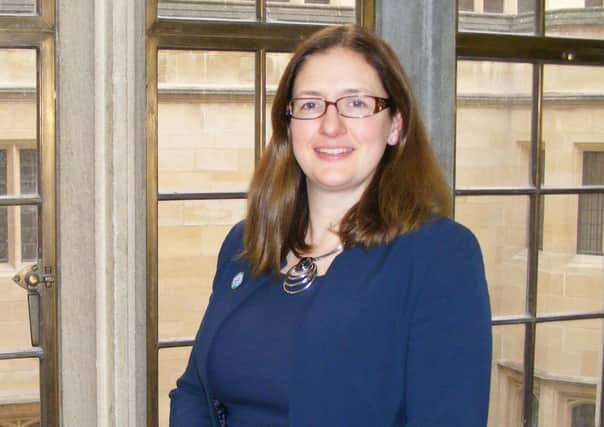Sleaford MP warns of spike in child protection referrals as pupils go back to school after lockdown


After six weeks of remote learning the Conservative MP for Sleaford and North Hykeham, who also works as a consultant paediatrician, warned the prolonged period away from classrooms had affected youngsters mentally and built up “safeguarding issues”.
Speaking in a debate on the Education department’s roadmap for a return to face to face learning in schools from March 8, she said: “My experience, as a consultant paediatrician working throughout the pandemic, has been that I have seen more children with psychiatric problems admitted to acute medical wards and, indeed, more children with eating disorders — something raised by the Royal College of Paediatrics and Child Health, of which I am a member.”
Advertisement
Hide AdAdvertisement
Hide AdOn safeguarding she explained: “Child protection referrals are down a third. They are often made by schools and we are likely to see a spike in those when schools return. It is right that the Government have made sure that schools are reopened first, and that we put children’s well-being right front and centre of all policy.
Dr Johnson commented that the plan to test pupils three times in their first two weeks back will be very useful - leading to some positive results.
She wanted to know that the Government would make provision for children who end up at home because they test positive. “Parents will not want children to miss any more education than they already have, so it is important that, before next week, before parents sign to give their consent to that testing, they are familiar with what will be available to those children who test positive.
She also asked the minister to ensure that, as schools reopen, they do so in a way that recognises the importance of sport to improve children’s overall health, wellbeing and academic performance.
Advertisement
Hide AdAdvertisement
Hide AdConservative chairman of the Education Select Committee Robert Halfon had opened the debate. He told MPs: “This past year has been nothing short of a national disaster for our children and young people.”
He added: “We need to know that catch-up is working. Of course, I credit the Department for its delivery of more than one million laptops, the Oak National Academy, the expanded national tutoring programme and much more, but catch-up cannot be just about the input; it is the output that matters. If this programme of support is to benefit children and convince the Treasury that it is value for money, it will require proper assessment of the outcomes.”
He added: “A national long-term plan for education will require some self-reflection. Ministers should consider the make-up of the school year and the school day, the lay-out of the classroom, behaviour control and the nature of the curriculum and assessment.”
Mr Halfon said a good catch-up programme must help the most disadvantaged, and if they look at education across the board, “we can help get the covid generation back on that life chances ladder of opportunity.”
Advertisement
Hide AdAdvertisement
Hide AdEducation Minister Gillian Keegan said: “We’re committed to investing in and expanding and transforming mental health services in England and we’ve committed an additional £2.3 billion of funding a year and 345,000 more children and young people will be able to get additional access and support by 2023/2024.
“And this builds on our existing support including our £8 million wellbeing for education return scheme, which has provided funding for expert advisers and training in every local authority area, and over £10 million of funding to mental health charities.”
She added: “In February, the Prime Minister did appoint Dr Alex George as a youth mental health ambassador to advise the Government and raise awareness on mental health. Plus, we are setting up a mental health in education action group which he will sit on.”
Responding to Dr Johnson’s points she said as well testing, they are extending the use of face coverings to all indoor environments, including classrooms, unless social distancing can be maintained. This will continue until Easter, when it will be reviewed.
Advertisement
Hide AdAdvertisement
Hide AdShe said the government has a £1.7 billion catch-up fund, but it has to be “outcomes-driven”. The Department has commissioned an independent research agency to analyse catch-up needs and monitor progress over the academic year, which will help understand the extent to which pupils may have fallen behind and how the impact of postponed learning is felt differently across the country.
They have appointed an education recovery commissioner, Sir Kevan Collins, who will advise Ministers on the approach for education recovery, to develop specific initiatives for summer schools.
On school sports provision she said that although online PE lessons have been available, no one can wait to get back to the sports fields, so more funding has been made available to enable school sports facilities to stay open longer, and much of this will involve community and volunteers.
Ms Keegan said that throughout the pandemic, vulnerable children have been prioritised by being allowed to continue to go to school.
Advertisement
Hide AdAdvertisement
Hide AdShe said: “As we move to full reopening, clinically extremely vulnerable children will still be advised to shield until March 31 and to continue with remote education, as will those children who test positive, as my honorable Friend the Member for Sleaford and North Hykeham mentioned.
“Schools are expected to deliver three to five hours of remote education to those who will continue with remote learning.”